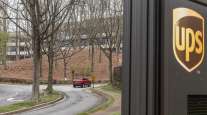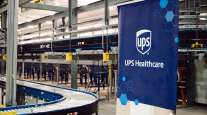Senior Reporter
UPS, Seattle to Launch eBike Downtown Delivery Program

UPS Inc. and Seattle Mayor Jenny Durkan announced Oct. 25 the parcel delivery company will begin a pilot project aimed at reducing congestion downtown and addressing air quality concerns.
Delivery drivers will use electric pedal-assist cargo bicycles with a customized modular trailer attached to the back of the bike.
Atlanta-based UPS says its cargo bike has a battery-powered electric motor that is capable of traveling longer distances than conventional bikes and can carry heavier loads as well as navigate hills and other challenging terrain.

(UPS Inc.)
The bike’s top speed is 20 mph, and it is designed to run for more than 12 hours before needing to be recharged. The modular, detachable boxes can carry 400 pounds of cargo and have a capacity of 95 cubic feet, which is about one-tenth the size of a conventional UPS delivery truck.
“What we’ve got in Seattle is the first-of-its-kind, U.S. deployment, modular eBike, mobile container solution,” Scott Phillippi, UPS senior director of maintenance and engineering for international relations, told Transport Topics. “There will be four boxes transported on a trailer … about 95 cubic feet. Those will be transported in with one of our delivery vehicles, on a trailer. And then, the package car that normally would have been in the Seattle area would get out of town and allow the people working the urban solutions to do their thing with the container and the bikes.”
UPS said it has used electric bikes in more than 30 cities in the United States and Europe, but the modular boxes and trailers will allow the drivers to expand the company’s delivery capabilities. For instance, the electric bikes will be able to make deliveries where conventional trucks cannot access now because of congestion or narrow streets.
“If you’re sitting in traffic and you can’t go anywhere because your vehicle is too big to get through … I’ve seen joggers pass me in traffic many times, and I think we’re going to see some similar comparisons where mobility is going to allow a lot more efficiency,” Phillippi said.
UPS is partnering with Seattle, and if the experiment is successful, plans are to expand the initial route and add others throughout the city.
“Seattle has always been the city that invents the future, and now we are partnering with one of our hometown companies to help drive innovations in transportation,” Durkan said. “As Seattle grows and public and private megaprojects limit capacity on our downtown streets, this pilot will help us better understand how we can ensure the delivery of goods while making space on our streets for transit, bikes and pedestrians. We are eager to learn how pilots like these can help build a city of the future with fewer cars, more transit and less carbon pollution.”
During the next year, UPS and the University of Washington’s Urban Freight Lab will evaluate the eBike’s reliability and design, and how the program worked. The lab’s main objectives are improving first-time delivery attempts and reducing dwell time, which the company, university and mayor hope will reduce traffic congestion and air pollution.
Ironically, UPS started in 1907 as a bicycle messenger delivery service called the American Messenger Company. Most deliveries were made on foot or using bicycles for longer trips.
UPS ranks No. 1 on the Transport Topics Top 100 list of largest for-hire carriers in North America. UPS Supply Chain Solutions ranks No. 2 on the Transport Topics Top 50 list of largest logistics companies in North America.




